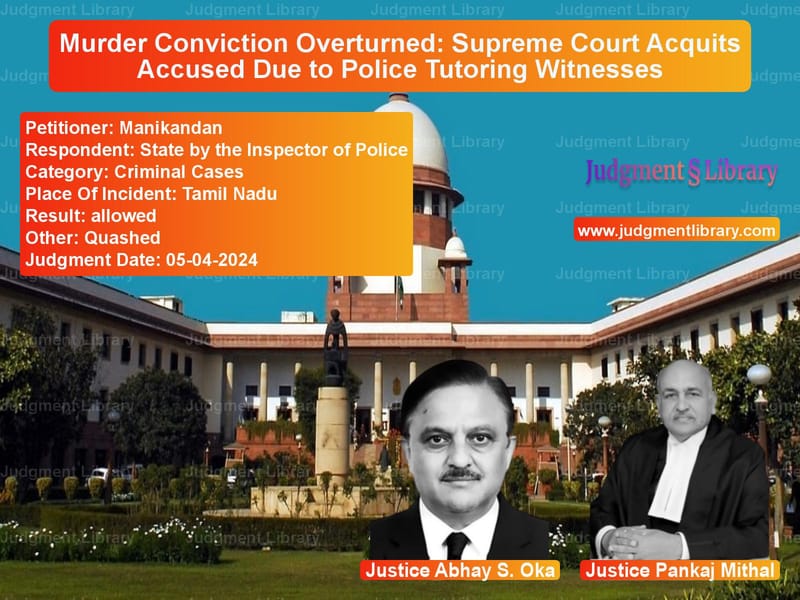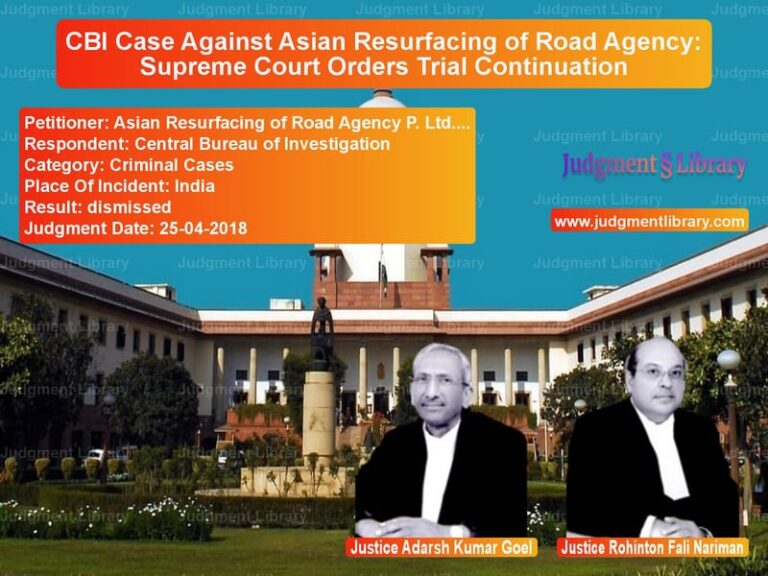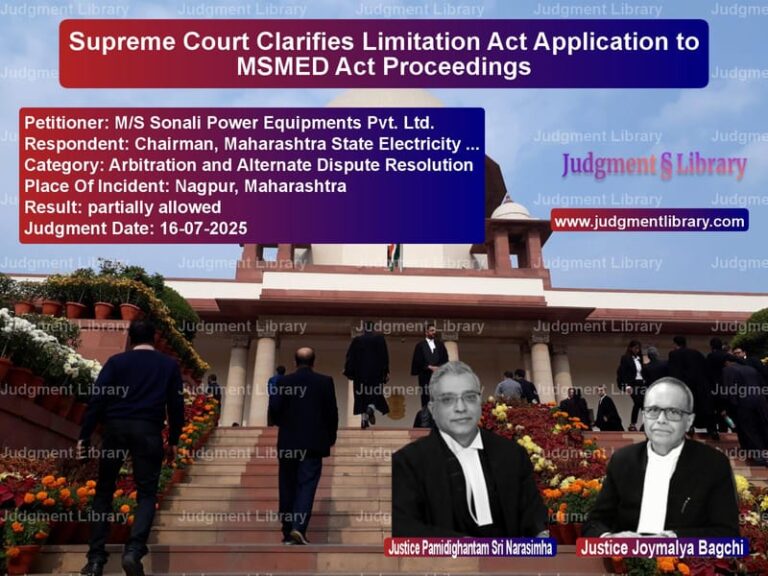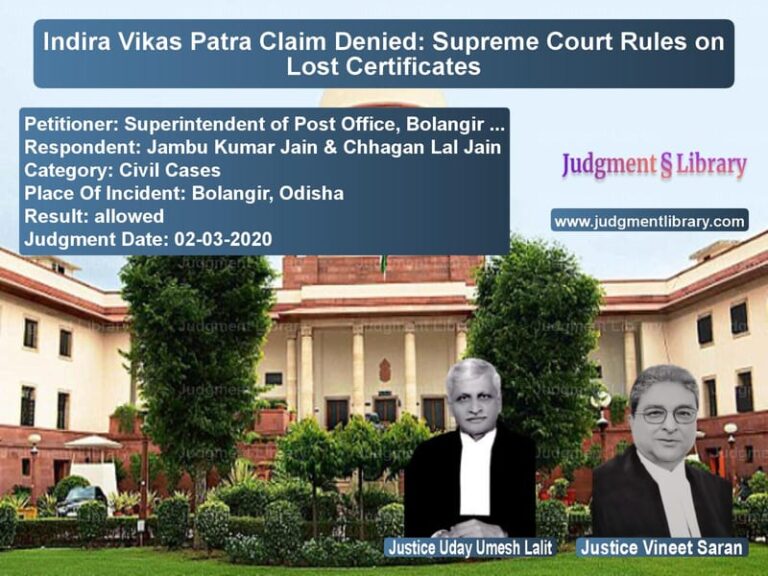Murder Conviction Overturned: Supreme Court Acquits Accused in 1996 Gujarat Killing
The Supreme Court of India recently delivered a crucial judgment in the case of Bhupatbhai Bachubhai Chavda & Anr. v. State of Gujarat, setting aside the conviction of the appellants in a decades-old murder case. The case revolved around the alleged killing of one Punjabhai in 1996, where the appellants were accused of assaulting the deceased with pipes and sticks, leading to his death. Initially acquitted by the Sessions Court, the appellants faced conviction by the Gujarat High Court. However, the Supreme Court reinstated their acquittal, emphasizing crucial errors in the High Court’s reasoning.
Background of the Case
The case originated from an incident on September 17, 1996, in Gujarat, where the prosecution claimed that the appellants assaulted the deceased, Punjabhai, leading to his death the following morning. The trial court, after analyzing the evidence, found inconsistencies and acquitted the accused on July 5, 1997. Dissatisfied, the State of Gujarat appealed against the acquittal in the High Court, which, on December 14, 2018, reversed the acquittal and sentenced the appellants to life imprisonment. The matter eventually reached the Supreme Court.
Arguments Presented by the Appellants
- The appellants’ senior counsel argued that the High Court’s approach in overturning the acquittal was flawed. They contended that the High Court relied on the police statement of an eyewitness (PW-4) without properly evaluating the trial court’s assessment.
- The counsel highlighted that the High Court shifted the burden of proof onto the accused, which was legally untenable. They argued that the prosecution must establish guilt beyond a reasonable doubt, and the accused were under no obligation to prove their innocence.
- It was further contended that the High Court failed to establish that the only possible conclusion from the evidence was the guilt of the accused.
Respondent’s Arguments
- The State of Gujarat argued that the High Court was within its rights to reappreciate the evidence, given that PW-4, an eyewitness, had given a clear account of the assault.
- The prosecution asserted that the Sessions Court erred in acquitting the accused and that a reevaluation of the evidence by the High Court justly resulted in their conviction.
Key Findings of the Supreme Court
- The Supreme Court emphasized that an appellate court must first determine whether the trial court’s view was a plausible conclusion based on the evidence presented. The High Court, it found, failed to address this key question.
- The Supreme Court held: “An order of acquittal strengthens the presumption of innocence of the accused. The appellate court can only interfere if the acquittal is found to be perverse.”
- The Court criticized the High Court for wrongly placing the burden of proof on the accused, stating: “Unless a statute explicitly places a burden on the accused, the prosecution must establish guilt beyond a reasonable doubt.”
- It further noted inconsistencies in the testimonies of prosecution witnesses, particularly PW-4, whose statement to the police differed from his testimony in court.
Supreme Court’s Verdict
The Supreme Court allowed the appeal, restoring the trial court’s acquittal. It held:
“The findings of the trial court were possible conclusions based on evidence. The High Court had no valid reason to overturn the acquittal.”
With this, the appellants were acquitted, and their conviction was set aside.
Implications of the Judgment
- This ruling reaffirms that appellate courts must exercise caution in overturning acquittals and should not do so unless the trial court’s judgment is demonstrably flawed.
- It strengthens the legal principle that the burden of proof remains on the prosecution and cannot be shifted to the accused unless explicitly provided by law.
Conclusion
The Supreme Court’s decision underscores the importance of upholding procedural fairness and the presumption of innocence in criminal trials. By reinstating the acquittal, the Court has reaffirmed the principle that appellate intervention must be based on clear and compelling reasons, ensuring that justice is not compromised.
Read also: https://judgmentlibrary.com/supreme-court-cancels-bail-of-accused-in-ghaziabad-murder-case/
Petitioner Name: Bhupatbhai Bachubhai Chavda & Anr..Respondent Name: State of Gujarat.Judgment By: Justice Abhay S. Oka, Justice Ujjal Bhuyan.Place Of Incident: Gujarat.Judgment Date: 10-04-2024.
Don’t miss out on the full details! Download the complete judgment in PDF format below and gain valuable insights instantly!
Download Judgment: bhupatbhai-bachubhai-vs-state-of-gujarat-supreme-court-of-india-judgment-dated-10-04-2024.pdf
Directly Download Judgment: Directly download this Judgment
See all petitions in Bail and Anticipatory Bail
See all petitions in Attempt to Murder Cases
See all petitions in Murder Cases
See all petitions in Judgment by Abhay S. Oka
See all petitions in Judgment by Ujjal Bhuyan
See all petitions in allowed
See all petitions in Quashed
See all petitions in supreme court of India judgments April 2024
See all petitions in 2024 judgments
See all posts in Criminal Cases Category
See all allowed petitions in Criminal Cases Category
See all Dismissed petitions in Criminal Cases Category
See all partially allowed petitions in Criminal Cases Category







